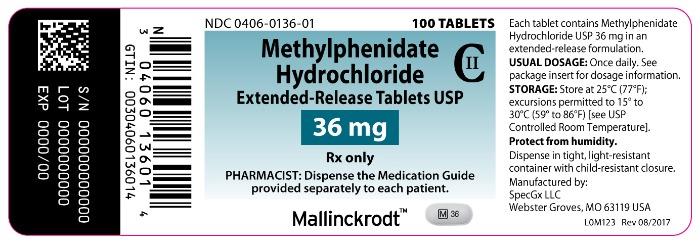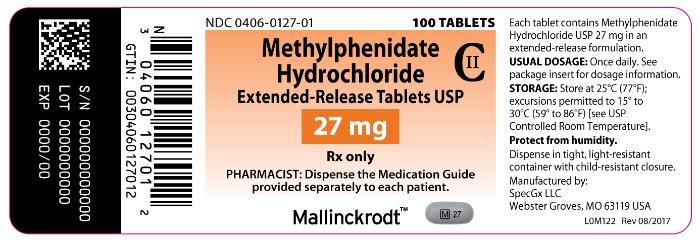For most of the drugs advantages of taking medications overweighs the potential risks however some drugs could be really dangerous for breastfed baby hence every medication shall be considered separately. In this page we will discuss about purpose of Methylphenidate Hydrochloride Extended-release | Methylphenidate Hydrochloride Tablet and its risk associated with lactation. We will also discuss the usage of Methylphenidate Hydrochloride Extended-release | Methylphenidate Hydrochloride Tablet and some common side effects associated with Methylphenidate Hydrochloride Extended-release | Methylphenidate Hydrochloride Tablet.
What is Methylphenidate Hydrochloride Extended-release | Methylphenidate Hydrochloride Tablet ?
Methylphenidate hydrochloride extended-release tablets USP are indicated for the treatment of Attention Deficit Hyperactivity Disorder (ADHD) in children 6 years of age and older, adolescents, and adults up to the age of 65 [see Clinical Studies (14)]. A diagnosis of Attention Deficit Hyperactivity Disorder (ADHD; DSM-IV) implies the presence of hyperactive-impulsive or inattentive symptoms that caused impairment and were present before age 7 years. The symptoms must cause clinically significant impairment, e.g., in social, academic, or occupational functioning, and be present in two or more settings, e.g., school (or work) and at home. The symptoms must not be better accounted for by another mental disorder. For the Inattentive Type, at least six of the following symptoms must have persisted for at least 6 months: lack of attention to details/careless mistakes; lack of sustained attention; poor listener; failure to follow through on tasks; poor organization; avoids tasks requiring sustained mental effort; loses things; easily distracted; forgetful. For the Hyperactive-Impulsive Type, at least six of the following symptoms must have persisted for at least 6 months: fidgeting/squirming; leaving seat; inappropriate running/climbing; difficulty with quiet activities; “on the go;” excessive talking; blurting answers; can’t wait turn; intrusive. The Combined Type requires both inattentive and hyperactive-impulsive criteria to be met. Methylphenidate hydrochloride extended-release tablets USP are a CNS stimulant indicated for the treatment of Attention Deficit Hyperactivity Disorder (ADHD) in children 6 years of age and older, adolescents, and adults up to the age of 65. (1) 1.1 Special Diagnostic Considerations Specific etiology of this syndrome is unknown, and there is no single diagnostic test. Adequate diagnosis requires the use of medical and special psychological, educational, and social resources. Learning may or may not be impaired. The diagnosis must be based upon a complete history and evaluation of the patient and not solely on the presence of the required number of DSM-IV characteristics. 1.2 Need for Comprehensive Treatment Program Methylphenidate hydrochloride extended-release tablets are indicated as an integral part of a total treatment program for ADHD that may include other measures (psychological, educational, social). Drug treatment may not be indicated for all patients with ADHD. Stimulants are not intended for use in patients who exhibit symptoms secondary to environmental factors and/or other primary psychiatric disorders, including psychosis. Appropriate educational placement is essential and psychosocial intervention is often helpful. When remedial measures alone are insufficient, the decision to prescribe stimulant medication will depend upon the physician's assessment of the chronicity and severity of the patient’s symptoms.
Can I use Methylphenidate Hydrochloride Extended-release | Methylphenidate Hydrochloride Tablet while breastfeeding?
Methylphenidate hydrochloride is the only one ingredient used in manufacturing of Methylphenidate Hydrochloride Extended-release | Methylphenidate Hydrochloride Tablet, Which makes it easier to analyze its effect in breastfeeding. As per our analysis of Methylphenidate hydrochloride it is safe to use Methylphenidate Hydrochloride Extended-release | Methylphenidate Hydrochloride Tablet while lactating. We suggest you to check further details below about Methylphenidate hydrochloride usage in breastfeeding.
Statement of Manufacturer/Labeler about breastfeeding usage
8.3 Nursing Mothers It is not known whether methylphenidate is excreted in human milk. Because many drugs are excreted in human milk, caution should be exercised if methylphenidate hydrochloride extended-release tablets are administered to a nursing woman. In lactating female rats treated with a single oral dose of 5 mg/kg radiolabeled methylphenidate, radioactivity (representing methylphenidate and/or its metabolites) was observed in milk and levels were generally similar to those in plasma.
Methylphenidate Hydrochloride Extended-release | Methylphenidate Hydrochloride Tablet Breastfeeding Analsys
SafeCAS Number: 113-45-1
The amount excreted to breast milk is so small that it is not detected in breast-fed infants. No adverse side-effects have been reported. Check-up for milk production since it may decrease Prolactin excretion on theoretical basis.
Methylphenidate Hydrochloride Extended-release | Methylphenidate Hydrochloride Tablet Breastfeeding Analsys - 2
CAS Number: 113-45-1
In dosages prescribed for medical indications, limited evidence indicates that methylphenidate levels in milk are very low and not detectable in infant serum. The effects of methylphenidate in milk on the neurological development of the infant have not been well studied. If methylphenidate is required by the mother, it is not a reason to discontinue breastfeeding.[1] It is possible that large dosages of methylphenidate might interfere with milk production, especially in women whose lactation is not well established.

What should I do if I am breastfeeding mother and I am already exposed to Methylphenidate Hydrochloride Extended-release | Methylphenidate Hydrochloride Tablet?
It is always a good idea to keep your healthcare provider or doctor informed about your drug usage during pregnancy and breastfeeding but if you have not informed your doctor about Methylphenidate Hydrochloride Extended-release | Methylphenidate Hydrochloride Tablet and have used it then do not panic as Methylphenidate Hydrochloride Extended-release | Methylphenidate Hydrochloride Tablet is mostly safe in breastfeeding and should not cause any harm to your baby.
My doctor has prescribed me Methylphenidate Hydrochloride Extended-release | Methylphenidate Hydrochloride Tablet, what should I do?
Definitely, Methylphenidate Hydrochloride Extended-release | Methylphenidate Hydrochloride Tablet is safe in lactation for baby. No wonder your doctor has recommended it.
If I am using Methylphenidate Hydrochloride Extended-release | Methylphenidate Hydrochloride Tablet, will my baby need extra monitoring?
No extra baby monitoring required while mother is using Methylphenidate Hydrochloride Extended-release | Methylphenidate Hydrochloride Tablet
Who can I talk to if I have questions about usage of Methylphenidate Hydrochloride Extended-release | Methylphenidate Hydrochloride Tablet in breastfeeding?
US
National Womens Health and Breastfeeding Helpline: 800-994-9662 (TDD 888-220-5446) 9 a.m. and 6 p.m. ET, Monday through Friday
UK
National Breastfeeding Helpline: 0300-100-0212 9.30am to 9.30pm, daily
Association of Breastfeeding Mothers: 0300-330-5453
La Leche League: 0345-120-2918
The Breastfeeding Network supporter line in Bengali and Sylheti: 0300-456-2421
National Childbirth Trust (NCT): 0300-330-0700
Australia
National Breastfeeding Helpline: 1800-686-268 24 hours a day, 7 days a week
Canada
Telehealth Ontario for breastfeeding: 1-866-797-0000 24 hours a day, 7 days a week
Drug Brands with same Active ingredients



